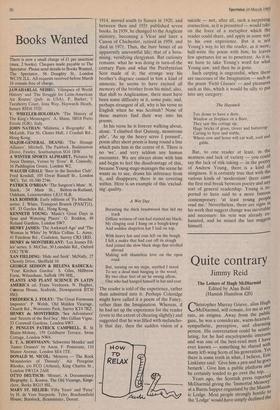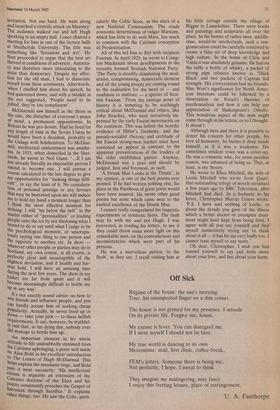Quite contrary
Jimmy Reid
The Letters of Hugh McDiarmid Edited by Alan Bold (Hamish Hamilton £20)
Christopher Murray Grieve, alias Hugh ,-McDiarmid, will remain, for me at anY rate, an enigma. Away from the public gaze, he was a considerate, warm-hearted, sympathetic, perceptive, and charming person. His conversation could be scintil- lating, for he had encyclopaedic interests and was one of the best-read men I have ever known — something he shared with many left-wing Scots of his generation. yet there is some truth in what, I believe, Erie Linklater said: 'Give him a pen and he goes berserk'. Give him a public platform and he certainly tended to go over the top. Years ago, the Scottish press reported McDiarmid giving the 'Immortal Memory' at a Burns Supper organised by the Mason- ic Lodge. Most people strongly hostile to the 'Lodge' would have simply declined the invitation. Not our bard. He went along and launched a vitriolic attack on Masonry. The audience walked out and left Hugh Speaking to an empty hall. I once chaired a meeting for him in one of the lecture halls at Strathclyde University. The title was something like 'Socialism and Art'. He then proceeded to argue that the best art thrived in conditions of adversity. Autocra- cy was therefore more stimulating to the artist than democracy. Despite my affec- tion for the old man, I had to dissociate Myself from these sentiments. Afterwards, When I chaffed him about his speech, he had quietened down, and with a twinkle in the eye suggested, People need to be Jolted, they're too complacent'.
McDiarmid saw himself as the thorn in the side, the disturber of everyone's peace of mind, a permanent oppositionist. In Britain he was pro-Soviet. Had he lived for any length of time in the Soviet Union he would have been a dissident, probably in the Gulags with Solzhenitsyn. To McDiar- mid, intellectual contentment was anathe- ma. In 1933, when domiciled in the Shet- lands, he wrote to Neil Gunn. `...If I am not already literally an impossible person I intend to become one...I will pursue a course calculated to the last degree to give me opportunities for "making things diffi- cult", to say the least of it. No considera- tion of personal prestige or any favours that may be bestowed upon me will induce me to hold my hand a moment longer than I think the most effective moment for striking: I will "hit below the belt" in the Matter either of "personalities" or leading people onto the ice by not disclosing what! intend to do or say until what I judge to be the psychological moment, or unscrupu- lously saying one thing to one person and the opposite to another. etc. In short — Whatever other people or parties may do in Scotland, my own course, at all events, is Perfectly clear and insusceptible of the slightest deviation, and if health and har- ness hold, I will have an amusing time during the next few years. The shots in my locker are far from spent and it will become increasingly difficult to bottle me up in any way'.
.It's not exactly sound advice on how to win friends and influence people, and you can hardly accuse him of seeking cheap Popularity. Actually, he never lived up or down — take your pick — to these hellish requirements. It can, however, be truthful- ly said that, to his dying day, nobody ever did manage to bottle him up.
An important element in his whole attitude to life undoubtedly stemmed from his Calvinist upbringing, a point well made bY Alan Bold in his excellent introduction to The Letters of Hugh McDiarmid. This belPs explain the messianic tinge, and Bold pats it most succinctly: 'His intellectual elitism is arguably an extension of the Calvinist doctrine of the Elect and his Poetry consistently preaches the Gospel of Salvation through Sacrifice.' It explains Other things, too. He saw the Celts, parti-
cularly the Celtic Scots, as the elect of a new National Communism. The crude economic determinism of vulgar Marxism, which has little to do with Marx, has much in common with the Calvinist conception of Predestination.
All of this led him to flirt with incipient Fascism. In April 1929, he wrote to Comp- ton Mackenzie about develbpments in the recently formed Scottish National Party. 'The Party is steadily eliminating the mod- eratist, compromising, democratic element and all the young people are coming round to the realisation for the need of — and readiness to institute — a species of Scot- tish Fascism.' From the vantage point of history it is tempting to be scathingly critical about McDiarmid and others, like John Strachey, who were tentatively im- pressed by the early Fascist movements on the continent. This was before the horrific evidence of Hitler's Germany, and the pseudo-socialist rhetoric and certitude of the Fascist strong-men leaders must have exercised an appeal in contrast to the apparent prevarications of the leaders of the older established parties. Anyway, McDiarmid was a poet and should be judged, first and foremost, as such.
'A Drunk Man Looks at the Thistle', in my opinion, is one of the best poems ever penned. If he had written nothing else, his place in the Pantheon of great poets would have been assured. He wrote other good poems but none which came near to the exalted excellence of the Drunk Man.
I cannot really comprehend his linguistic experiments or synthetic Scots. The fault may lie with me and not Hugh. I was interested, in reading his letters, to see if they could throw some more light on this remarkable man, on the contradictions and inconsistencies which were part of his persona.
He was a marvellous person 'in the flesh', as they say. I recall visiting him at
his little cottage outside the village of Biggar in Lanarkshire. There were books and paintings and sculptures all over the place. In the homes of rather twee, middle- class, would-be intellectuals, such a con- glomeration could be carefully contrived to create a false air of deep knowledge and high culture. In the home of Chris and Valda it was absolutely genuine. He had on the table a bottle of whisky, a packet of strong pipe tobacco known as 'Thick Black' and two packets of Capstan full strength. His conversation had no bounds. Mae West's significance for North Amer- ican literature could be followed by a dissertation on Freud's theories of psychoanalysis and how it can help our appreciation of Shakespeare's Othello. This wondrous aspect of the man might come through in his letters, or so I thought. It doesn't.
Although here and there it is possible to detect his concern for other people, his love of humanity, he buries it deep inside himself, as if it was a weakness. His sometimes strident voice was a cover-up. He was a romantic who, for some peculiar reason, was ashamed of being so. That, at least, is my theory.
He wrote to Rhea Mitchell, the wife of Leslie Mitchell who wrote Scots Quair, that outstanding trilogy of novels serialised a few years ago by BBC Television, after Mitchell had died. In a footnote to his letter, Christopher Murray Grieve wrote: `P.S. I have said nothing of Leslie, or about the details you gave of the illness which a better doctor or prompter treat- ment might have kept from being fatal. I agree with all you say yourself and find myself instinctively trying not to think about it all — it has hit me very badly too. I cannot trust myself to say more.'
Oh dear, Christopher, I wish you had trusted yourself to say and write more about your love, and less about your hates.



















































 Previous page
Previous page